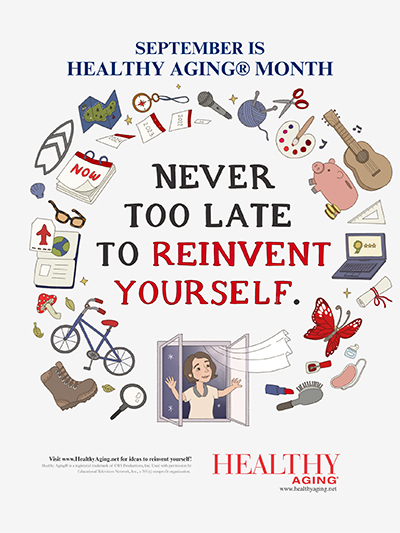 By Dr. Alla Zilbering
By Dr. Alla Zilbering
All our lives, we’re encouraged to “eat right.” We know the benefits of a healthy diet for growing children and young adults, but getting proper nourishment is also essential as we age.
But, what does that mean exactly?
Think of good nutrition as the fuel that helps us remain active and strong so we can keep enjoying all that life has to offer. Maintaining a healthy diet can even help ward off or better control chronic conditions that may occur as we get older, such as diabetes and high blood pressure.
Eating a nutritious diet on a regular basis can be challenging, however. Many older adults are so active, they don’t prioritize eating well throughout the day. Others become less active, so their metabolism slows down and they don’t require as much energy from food, so they eat less.
Sometimes, people lose their appetite for food in general, or their tastes may change. A person’s physical condition or dental issues can also affect one’s motivation to eat.
Access to healthy, nutrient-rich food is also an issue for some older adults. The ability of an older person to eat healthy food on a regular basis can depend on where they live, their economic situation, or whether they can easily obtain transportation.
The current pandemic also has an impact on food habits. To limit exposure to the COVID-19, many of us are limiting trips to public places. So, we may not go shopping for food staples as frequently as we normally would. But that means we’re not stocking up on the food we need to stay healthy, which is especially important during this time.
For so many reasons, good nutrition is fundamental to taking care of your body throughout your life. The right food improves your mood, your health, and your abilities, so you can continue to enjoy all the things you love to do.
Consider these nutrition tips and resources:
Check in with your doctor
If your appetite has waned or you seem to be losing weight without trying, talk with your primary care physician. There may be an underlying reason for these changes.
For example, a certain medication you take might have an effect on your appetite or you could be dealing with depression. Talking with your doctor can help you identify potential causes. And, even if you’re not venturing outside your home during the pandemic, you should still stay connected to your doctor.
Ask about telehealth or online health care appointments to get the medical advice you need. Some insurance plans cover such virtual care, so check your benefits.
Enjoy a rainbow of tasty food
It’s fun to fill your plate with colorful, nutrient-dense, fiber-filled fruits and vegetables. Add flavor with spices and herbs instead of salt. Explore different preparation methods, like roasting, to bring out the fantastic flavor in vegetables you might never have enjoyed, like Brussels sprouts (yes, Brussels sprouts). Check your health plan, as some even offer a gift card for fresh produce or coupons to use at the grocery store as part of their benefits package.
Hydrate, move, repeat
Stay ahead of your thirst by drinking water often so you’re hydrated throughout the day. When it comes to stimulating your appetite, move regularly. Even light exercise strengthens bones and muscles to keep you strong.
Adapt to your changing tastes
Don’t give up – there are many ways to change your habits to improve your nutrition, from eating more frequent, smaller meals to trying new foods and cooking styles. For tips on preparing healthy meals, visit ChooseMyPlate.gov
Practice good dental hygiene
Your dentist can help treat any mouth or teeth issues affecting your ability to enjoy food. Check your health plan for details. For example, some Medicare Advantage plans cover access to dental benefits at no extra cost.
No car? No problem
Look into local organizations that offer transportation or meal delivery to older adults. Using home delivery services for groceries online is also helpful for anyone who still wants to cook their own meals, but doesn’t want to (or can’t) leave home.
If you have a Medicare Advantage plan, you may have access to home-delivered meals following a hospitalization. Here’s an eye-opening statistic: One-third of hospital patients are malnourished when they’re admitted and poor nutrition increases their risk of having to return to the hospital after release. A healthy diet helps patients regain their strength and energy more quickly for better recovery. Check your health plan for details.
Know your options
Some older adults with limited resources may qualify for assistance with food purchases through programs such as the Supplemental Nutrition Assistance Program (known as “SNAP”). Many people who qualify for this program don’t even know it. Verify eligibility by visiting Cigna.BenefitsCheckup.org. Just scroll down and click “Get Started” under the “Food & Nutrition” section. If you aren’t eligible for this type of assistance, you can still find ways to save on food costs. Look into senior discounts, use coupons and store discount cards, and buy cheaper (but good quality) store or generic brands.
Each individual has unique needs and preferences. Always start by talking with your doctor to get personalized guidance customized to your own nutritional requirements.
Throughout this article, I mentioned checking your health plan so you’re aware of and taking advantage of your benefits. Keep in mind that the Annual Election Period, when people eligible for Medicare can shop for their plan, is open now. Health needs change year to year, so now is the time to make sure your plan has all the benefits you need to stay healthy and strong in 2021. If it doesn’t, you can shop for a new plan before the deadline of December 7. To find out more, go to Medicare.gov/plan-compare or cigna.com/medicare.
Dr. Alla Zilbering is a board-certified internal medicine physician in Philadelphia. She graduated from SUNY Buffalo School of Medicine and completed her Internal Medicine training at Temple University Hospital. She currently serves as the market medical executive for Cigna’s Pennsylvania region.













